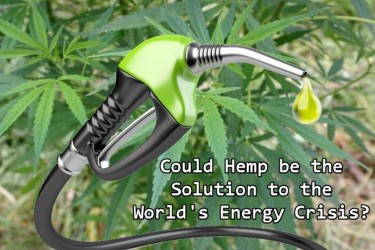
Hemp biofuel – the answer to the highest CO2 levels on earth in 4 million years
The world is currently facing a major environmental crisis and energy sources are at the heart of this global challenge. We need the power to move things and make industries thrive, but do we use sustainable energy sources? Are we going for clean energy, and if not, what are the viable options?
Environmental challenges and biofuel
Global warming and climate change are the serious threats the world is currently facing as they pose a threat to our planet. Countries and energy sectors are starting to look for more sustainable fuel sources and this led to the development of biofuels.
Unlike gasoline, which is very popular, biofuel is made from living organisms. Vegetable materials are used, as well as other materials such as vegetable oil and animal fat. These materials are combined with regular fuel to create a unique product that is not harmful to the environment.
With this invention, the world began to accept biofuels and it made a lot possible for the energy sector. With more research and testing, experts begin looking for additional, safer alternatives, and then HEMP was highlighted as an option.
Experts are thinking about using hemp as the primary energy source: It is an easy-to-grow crop with many versatile uses. If hemp has such opportunities, what are the barriers to this idea? Is Hemp Biofuel the Answer to the Environmental Crisis? Read on for answers.
The world of biofuels
Biofuels are made from plant or animal materials and are much safer for the environment than traditional gasoline and fossil fuels. Grouped into three main classes (the first, second and third generation), this is becoming a very popular alternative around the world.
The first generation of biofuels was made from starch and sugar through distillation and fermentation into ethanol for gasoline.
In the second generation, the biofuels are obtained from organic waste, wood and biomass. The materials are pretreated and converted into ethanol as the end product.
With the third generation biofuels, they are now obtained from algae oil through an extraction process, whereby the converted oil is used as biofuel.
Types of biofuels
There are two types: ethanol and biodiesel, both of which are good for the environment.
Ethanol is very popular; It’s pure alcohol and the same compound you find in your favorite “adult” drink.
Well, as you may know, excessive alcohol consumption can end up at a bad point in life, but did you know that sugar cane and corn are the main ingredients for ethanol? Oh yes, and it’s renewable with 15% less gas emissions than regular fuel.
Biodiesel, on the other hand, is similar to conventional fuel, but with one major difference: it is made from vegetable or animal oil. Algae are also used in this idea, but scientists are starting to look for other genetically modified plants.
One of the viral biodiesels is called B20, which consists of 80% petroleum and 20% biodiesel, but reduces CO2 emissions by 20%. Like ethanol, it is renewable in that it is made from recycled ingredients. it also minimizes waste.
Hemp as a major biofuel
Hemp has tremendous potential for the biofuel industry as it is a sustainable option made from renewable resources. In this day and age, large corporations and car brands like Ford, BMW and Volkswagen rely on the harvest for interior components like door panels. In terms of powering the vehicle, hemp biofuel is classified as a viable option.
The main economic benefit of hemp biofuel, as presented by the American Environmental Protection Agency (EPA), is that it is beneficial to the environment.
So when the biofuel is burned in an engine (any engine), the carbon dioxide is released into the atmosphere. Unlike traditional fuels, this recycling pattern does not lead to an accumulation of CO2, which reduces the negative impact on the planet.
The agricultural income is also an economic advantage of biofuels, as the products are in high demand and farmers earn more money in the long term. Since biofuels are produced locally, this leads to a reduction in fuel consumption.
The benefits of hemp biofuel
Aside from the benefits we mentioned above with biofuel, hemp biofuel in particular has many other benefits. The biggest benefit is that it can grow on borderland, which is a piece of land with poor soil quality.
As an easy-care plant, hemp can thrive in the worst of soil conditions, and that means anyone can explore the hemp biofuel option. All you have to do is get the cannabis seeds and you are good to go.
Some plants require a large amount of fertilizer to grow; this idea is like a standard practice in the agriculture department. The challenge with most fertilizers, however, is that they contain many pollutants that have a negative impact on the crops.
When it rains, the soil is washed into the water, disrupting the marine ecosystem, contaminating the water and killing marine life.
However, since you don’t need high soil fertility with hemp plants, you don’t have to resort to chemicals and fertilizers. With a small number of nutrients, your hemp plant will provide you with abundant yields, so you can accomplish quite a lot with little effort.
The hemp plant also gives the nutrients back to the soil: 70% of the nutrients go back into the earth, which means that the earth can generate higher yields with consistent use.
Bottom line
Mother Earth needs a break from the damage we have done to her through emissions and other harmful environmental practices. There is a worldwide awareness of the need to look for alternative sources of energy and again hemp comes to the rescue.
Hemp biofuel is a viable, sustainable energy alternative, and we can get many benefits that will save the planet, have safer sources of energy, and breathe cleaner air. The hemp plant and its cousin cannabis are doing the world a lot of good and we are here for that!
WHAT IS HEMP FUEL, READ MORE …

CAN HEMP FUEL BE A SOLUTION TO THE GLOBAL ENERGY CRISIS?
OR..

ARE HEMP CAR BATTERIES THE FUTURE OF ELECTRIC CARS?

Post a comment: